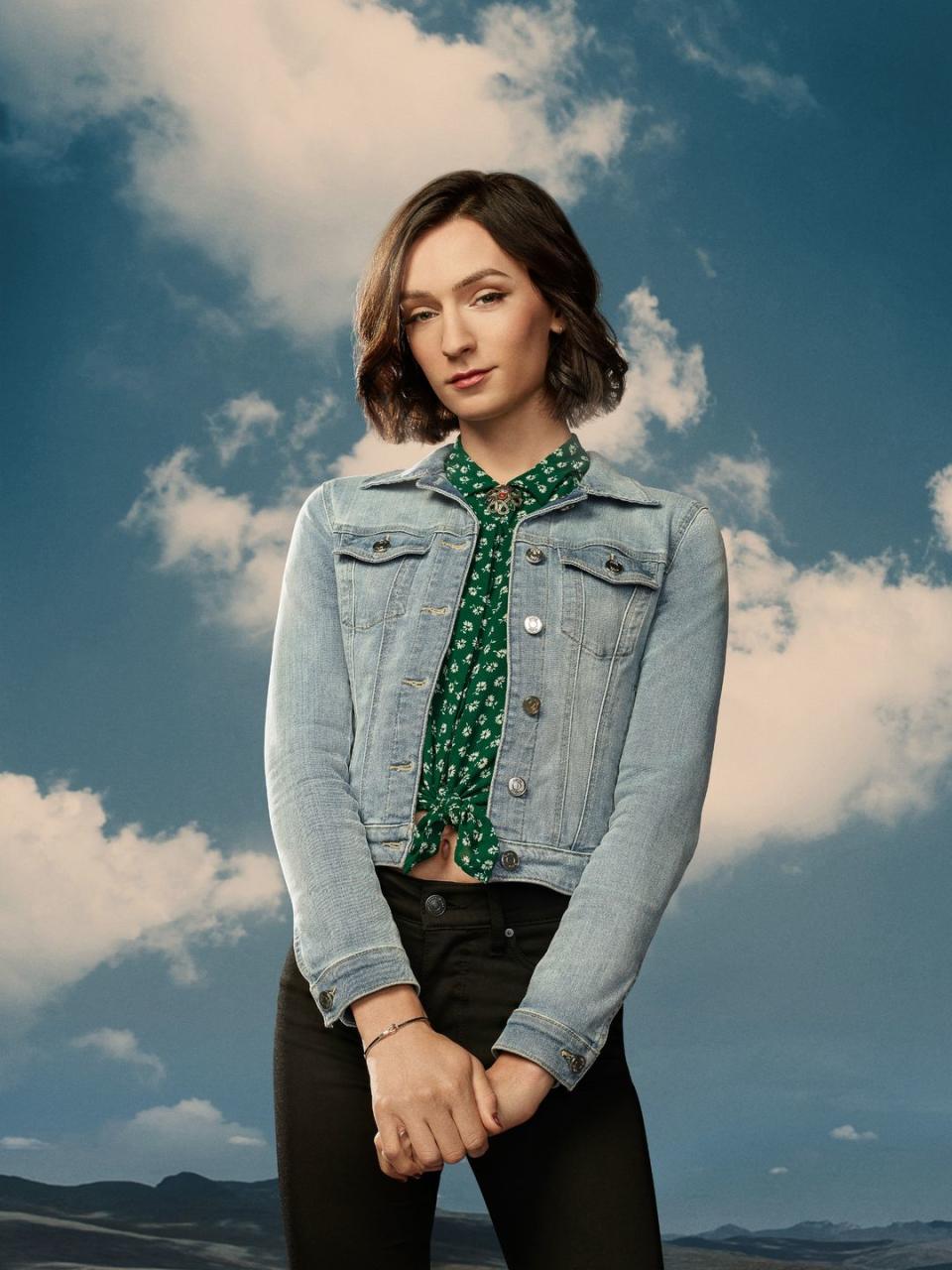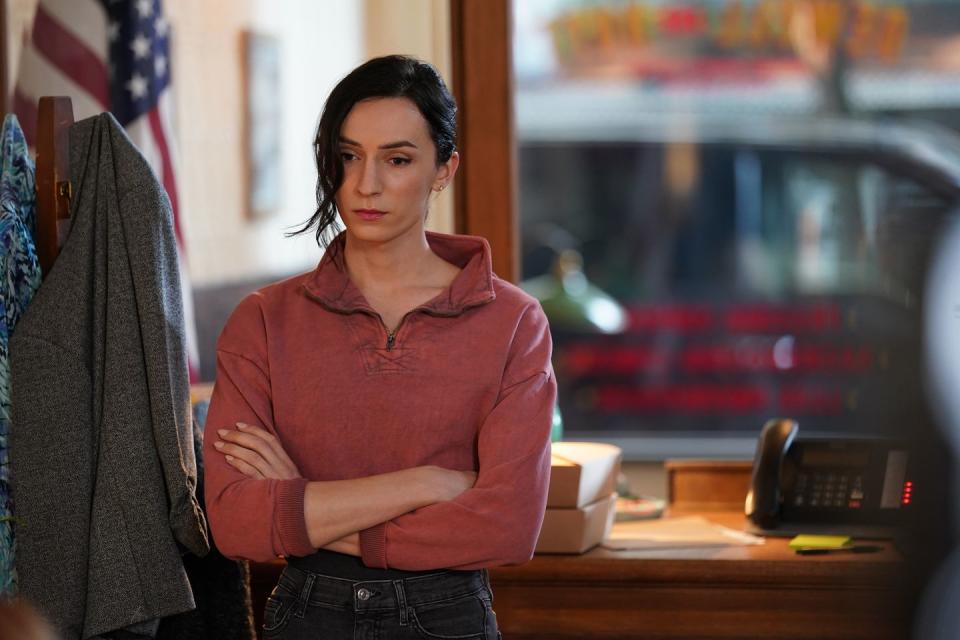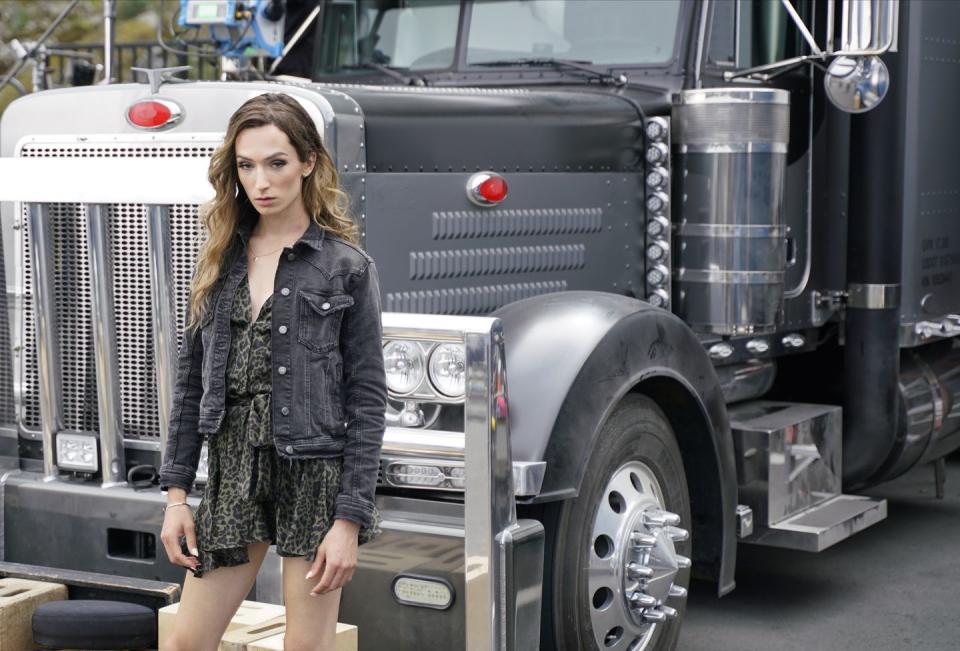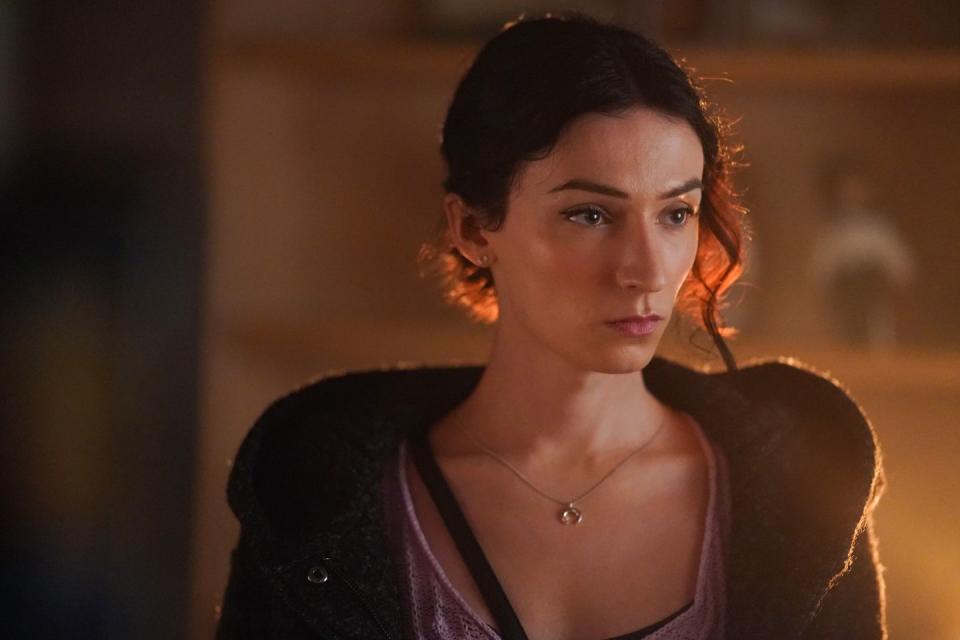Big Sky's Jesse James Keitel on Jerrie's future and their new role in season 2

- Oops!Something went wrong.Please try again later.
Rainbow Crew is an ongoing interview series that celebrates the best LGBTQ+ representation on screen. Each instalment showcases talent working on both sides of the camera, including queer creatives and allies to the community.
Next up, we're speaking to Big Sky star Jesse James Keitel.
Much has been said about Jesse James Keitel breaking new ground as the first non-binary actor to ever play a series regular on primetime TV. And rightly so. That's a phenomenal achievement which can help inspire genuine change in the stories we see on screen.
But amongst all that praise, what's sometimes not emphasised enough is just how brilliant Jesse's actual performance is on Big Sky, regardless of any precedent that they've set beyond the show.
Because from the moment that Jerrie Kennedy first strolls onto our screens, it's clear that Keitel's breakout role is the highlight of this show. And as season one progressed, Jesse took what could have been a clichéd or melodramatic character and moulded them into something far more nuanced and infinitely watchable.

So with that being said, we were delighted to chat with Keitel over Zoom about what the future holds for Jerrie in future episodes of Big Sky. Along the way, we also discussed Disney, conservative grandmas, and Jesse's new role as a trans consultant in season two.
Now you've got a whole season under your belt, how do you feel about the fan expectation that comes with such a groundbreaking part?
That's a very interesting question because I think I felt a lot of fan expectation from my peers. And the funny part is, I actually don't think a lot of my peers are the audience of the show. I think the audience of the show skews a little older than myself.
While I know there are definitely a lot of LGBTQ+ people who do watch the show, I actually feel like the biggest impact the role has had is on older, more conservative, non-queer people.

So to talk about fan expectation? I don't know. I have no idea what fans expect from Jerrie in terms of representation. I know what I expect from Jerrie. And I think what I expect from Jerrie far exceeds what any fan may want.
It's so great to hear that Jerrie is having such a big impact on people who might not usually be exposed to queer culture.
And, hey, that's the power of network television. You're reaching a large amount of people who… they're not paying extra for cable. They're not paying extra for HBO, and sometimes not even for Netflix, etcetera. They're watching this on TV.
The fact that a character like Jerrie Kennedy, a former sex worker, an inspiring musician, someone who is trans, and is now solving crimes, and is just being an all-round badass in season two – that's major, the fact that they can just turn on their TV and see a person like this who isn't rife with tropes and derogatory language around trans people.
Because I've been told multiple times that Jerrie Kennedy on Big Sky was a lot of people's first introduction to a trans character. Which I mean, I have to say, to me, I'm like, "Girl, what rock have you been hiding under?" But it's real.
There's all these amazing LGBTQ+ shows out there, but people aren't necessarily watching them because they're not on network TV, so it's great to have something this powerful also be so accessible.
And also, I hold network television to a different standard. Network television has an opportunity that I often think streaming only takes advantage of. I want to see network television take more risks. I know they have to appease a wider range of people, and they can't alienate a large chunk of viewership by getting too heavy into one topic or another.
But I'm like, "Man, you have an opportunity with Jerrie Kennedy" and I'm excited to see that really blossom.

We read that you helped the writers shape Jerrie to some degree. Can you talk through the specifics of that?
So, to clarify, I was not a writer. I was not a consultant of any kind for season one. That being said, I was often putting my lived experience and my knowledge of trans people and this character… I was bringing that to the producers very often, when there was something that felt like a missed opportunity with Jerrie, or there was something that may have raised a red flag here or there, I was very vocal and very quick to make myself known on that.
Even before I was involved in the show, I think there was a lot of confusion over: is this character a cis woman? Is this character a gay man? Is this character a drag queen? Is this character a gender fluid artist? Is this character a trans woman? Et cetera, et cetera.
Early in the process, I got to lend my opinion on who I believed the character to be. Then the pandemic happened, and we revisited everything a few months later. I got to see my comments on what they wrote come into fruition.
But that being said, I will be acting as a trans consultant for season two, and GLAAD has also gotten involved, moving forward. So I have not had the opportunity to lend my input for season two as of yet. It's still very early in the process.
I'm a firm believer that any writer can write any character, but the appropriate parties should be consulted with, and paid and credited accordingly. I think that ABC and Disney made a hugely important step in the right direction by bringing me on as a consultant. I'm not a writer on the show, but the fact that I am there, if and when the writers are interested in tapping into my lived experience, or are interested in hearing what I have to say about what Jerrie's lived experience may be – there's actually a position that I am credited with for this season.
I know that Euphoria had a consultant. Clarice – Jen Richards was a consultant. So this is not the first show, but this a step in the correct direction.
Given your input, are there any aspects of Jerrie's story that resonate with you in particular?
Jerrie's woes about her family early on, I think really ring true. I have a great relationship with my parents, but I think that a lot of queer people have a really hard time with the people they love.

So the fact that Jerrie was kicked out at 14 and forced to live in a trailer park and had to fight for what was hers from a very young age – she had to grow up really quickly. Queer people as a whole have to grow up so fast, so many times.
You can see that things are rapidly changing, and it's definitely a lot easier to come out as a queer person in 2021 than it was even, what, 15 or 16 years ago – for me. It's… [pause] you know, it's something that a lot of LGBTQ+ people can empathise with, that desire to be accepted by the people you love who are supposed to love you back, but feeling a sense of inadequacy, that you have to fight on a different plane than your cishet counterparts. It's something I definitely have to fight with.
Talking about your younger self has reminded me of that Toy Story song you performed recently to celebrate Pride Month with Disney. 'When She Loved Me' is such a moving song, and you performed it so beautifully.
Oh, thank you. I was like: "Girl, I cannot do this Sarah McLachlan song. You guys are crazy." Yeah, that was a bit surreal, to be honest, getting to do that. I was like, "You guys, I'm not famous enough or good enough as a singer for this, but thank you for the opportunity." [laughs]
I really hope they do more of these events because as a kid, I never felt like I had one character who I could watch on TV, and be like, "Oh my God, that is who I am." I think the closest thing was probably Kurt from Glee, back when I was 14. That was the only proximity to queerness that I understood at the time.
But quickly, if someone ever compared me to him, I'd be like, "Fuck you, that's not me." I didn't have the language or the vocabulary or the role models to point to, and be like, "No, no, no. Ma'am, that is not correct. It's that person. It's her, over there."
Back to Big Sky, is there anything you can tease yet about season two?
I would say, Jerrie's hopes and dreams are coming true. But they're also certainly changing. What she wants in her career is not what she wanted a year ago. The funny thing is, to be honest, we're also only told broad strokes. I know very little of what will actually be on the page. But we know a general, rough kind of episode idea. It's tough [laughs].
Can you talk us through why that's challenging?
I would say the hardest part is– I come from theatre. I love getting a play, from start to finish. You know exactly who you are at the beginning, and who you are at the end, and who you were 10 years ago, and who you're going to be 10 years from now.
With television, it's much harder to build a fully formed character when you're going episode by episode – I think, in my personal opinion. Because you've got facts about your character that come out 10 episodes later. It's like, "OK, I would have possibly performed that first scene a little differently had I known that."
And writers – they sometimes start to write for you. They start to write for your voice, and the choices you make. When you walk out of a room with a little wink, they realise, "Oh, maybe there's some connection with those two characters." And all of a sudden, you have a new storyline. A lot of it depends on what you bring on the day, which is both very exciting and can be very frustrating.
Looking back, are there any scenes from season one that you'd approach differently now?
I think after Jerrie was rescued, and she started coming by the office to help out – she wasn't officially an employee there yet, but she was just helping to find Ronald – I think Jesse, the actor, really leaned into the trauma of what she had just gone through.
Looking back, I would have taken a more active choice that was less kind and soft-spoken, and more: "I'm really fucking pissed at what just happened to me", and the fact that this person is still out here, and can hurt people.
I do think I had both flavours of that. But I would have leaned in a little more heavily to the potential for badassery in Jerrie, instead of the covering up and wearing sweaters and "Oh my gosh, this is sex trafficking". I think she would have had more of a fire that unfortunately I think Ronald had ended. Listen – I guess there's nothing wrong with the choice. But, you know…
What do you hope lies in store for Jerrie moving forward?
I want to see Jerrie make mistakes. I think, often, especially when there is some kind of groundbreaking representation with a marginalised character – people are scared to allow a character to fuck up.
I want to see Jerrie make some really bad mistakes interpersonally in her relationships at work, on the job. I think the biggest mistake she's made to date was trusting Ronald at the truck stop in episode one. That kind of set into motion her being sex trafficked.
I want to see Jerrie find fulfilling romance, and that doesn't necessarily mean a happy ending. But I want to see her have romantic feelings that are reciprocated and respectful.
What message do you hope your character sends out to the world, and perhaps also your work in general. What takeaway do you want people to have?
Oh, God. That's a big question. [laughs] From a representation standpoint, I hope people can watch the show and remove any biases they may have had towards LGBTQ+ people, specifically trans women, and fall in love with a very likeable character. Perhaps change how they feel about queer people in their everyday lives, or the queer people they have only heard of – these mythical queers.
I want Jerrie to become some conservative grandma's favourite character, who can then turn around and embrace her own queer grandchild for the first time. That is the reach that a character like Jerrie can have.
And for my own career? I don't know. I hope people find me entertaining. I think my biggest fear is either overdoing it or under-doing it. And I hope I'm hitting a sweet spot. I hope people enjoy it, and can picture me in roles that aren't a trans sex worker.
Just like Jerrie, I have some big aspirations, and I hope my queerness, my queer status, my trans status, doesn't inhibit people from seeing me occupy other spaces. I love Natalie Alyn Lind and Jade Pettyjohn, who play the sisters on the show. But is there a world in which I could have been cast as one of them? Is there a world in which I could have been Cassie Dewell or Jenny Hoyt?
Now that Jerrie has since come into her own in season two – you will see her out in the field with a gun, and perhaps a new title. Now that that has happened, I feel like, in myself, I see new opportunities, instead of playing a trans sex worker who gets tasered and thrown into the back of a truck.
Big Sky season 2 will premiere on September 30 at 10pm on ABC.
You Might Also Like

